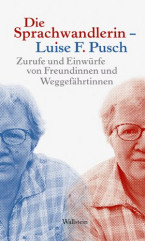
(Janet Paterson Frame; Nene Janet Paterson Clutha [real name])
born on August 28, 1924 in Dunedin, New Zealand
died on January 29, 2004 in Dunedin, New Zealand
New Zealand writer
20th anniversary of her death on January 29, 2024
100th birthday on August 28, 2024
Biography
“Anyone watching me back then,” Janet Frame said of her school days, “would have seen an anxious child standing alone on the playground at school, and wearing day after day the same tartan skirt, a hand-me-down from my sisters, that was almost stiff from being worn all the time, because it was the only clothing I had. A freckled, frizzy-haired little girl who was somehow 'dirty', 'dirty and poor'.”
“You Frame girls think you're so different from everyone else,” said the teacher, but Janet Frame, the third of five children in a railroad worker’s family, had settled into “the homelessness of adolescence,” into a “nest of otherness that others prepared for me, but for which I chose my own furnishings.” She furnished it with words and imagination. She populated it with her “eternal heroes”: the poets Daudet, Victor Hugo, Keats, Shelley, Wordsworth, Yeats and Shakespeare. She wrote in her diary: “Dear Mr. Ardenue, you think I'm going to be a teacher, but I'm going to be a poet.”
From 1943 on she studied English, French and psychology. In 1945 and almost 21 years old, she began her practical year of teacher training. “I was enthusiastic about the children,” but “too shy to drink tea in a room full of other teachers.” During a lesson that was being observed by an official, she “walked out of the room and out of the school” and knew that she “would never come back.”
She attempted suicide and was taken to a hospital in Dunedin for “recuperation,” and later to the Seacliff Mental Hospital, where she received an “intensive course on the horrors of insanity and the living conditions of those who have been classified as insane.” Wrongly diagnosed as a schizophrenic, she spent the following eight years in various psychiatric institutions, and received a total of “over two hundred merciless electroshock treatments, with the fear experienced making each one of them feel like an execution.” Her collection of short stories, The Lagoon and Other Stories, was published in 1951 to critical acclaim, and she received a prestigious award. The lobotomy was cancelled and she was released on probation in 1954.
In the same year, the writer Frank Sargeson offered her a place near Auckland “to work and to be alone ... The time was ripe. I bought a notebook, some paper, a typewriter ribbon and began to write my novel.” Owls Do Cry, published in 1954, dealt with the tragedy of her family (two sisters drowned; her brother suffered from epilepsy) and her escape from the clutches of psychiatry through her writing. The traumatic experiences in psychiatric institutions launched the career of – along with Katherine Mansfield – New Zealand's most important writer.
(Text from 2003; translated with DeepL.com; edited by Ramona Fararo, 2023.)
Please consult the German version for additional information (pictures, sources, videos, bibliography).
Author: Susanne Gretter
Quotes
I have discovered that my freedom is within me, and nothing can destroy it. (Letter to John Money, 3 October 1948, on being committed to Seacliff Hospital)
If you hold the rights to one or more of the images on this page and object to its/their appearance here, please contact Fembio.



